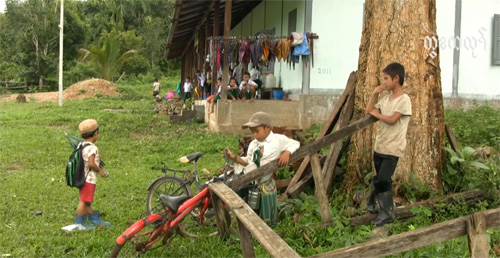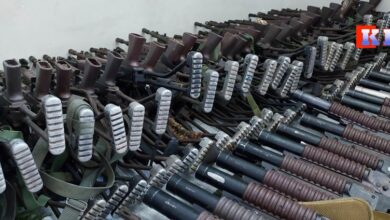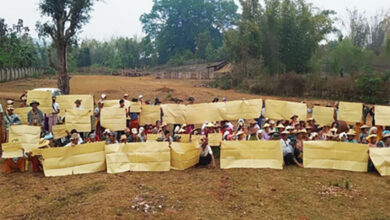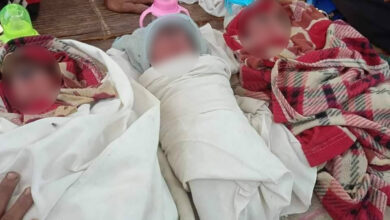Schools out for Taw Eh Ah

It is early morning in Wa Su Ko village. It is quiet. Mist from the monsoon rains necklace the surrounding mountains. The small village is located east of the Burma town of Tavoy. A small boy dressed in a big, dirty white shirt and yellow shorts is carrying a traditional Karen bamboo fish basket trap. The boy is returning from the nearby river after checking his overnight fishnets. The boy has caught small fishes for his mother that will help feed the family.
The boy’s name is Saw Taw Eh Ah and he takes time to explain his situation.
“My mom told me that my father was shot and killed by a Burma Army soldier.”
Saw Taw Eh Ah,11, lost his father when he was three months old.
“Mother told me my father name was Saw Dah Seik.”
Saw Taw Eh Ah’s mother, Naw Lu Dee, now 35, confirms her son’s words.
“My husband died in 2001, it was January 19, on a Friday. He was looking after for his cattle and those of the whole village. He returned about 12noon. I heard gunshot. I didn’t know what was happening. People came and told me that a Burmese soldier had shot my husband. I went and saw my husband and he was shot dead beside the road. He didn’t do anything wrong, he was just looking after cattle.”
Wa Su Ko village is a Karen village east of Tavoy, Southern Burma. The Karen civilians are often caught in the crossfire of the civil war between the Karen armed struggle by the Karen National Union (KNU) and the Burma Army.
Saw Ko, a former village elder in the area said.
“For the past 10 years I think over 30 Karen civilians were killed by the Burma Army or their militias. Most of them [villagers] were accused and killed without reason or under any law.”
This year the KNU reached a cease-fire agreement with the Burmese government.
Naw Lu Dee said.
“We hope we can now live in peace and earn our living in peace. We hope we will progress and make enough for our living.”
Naw Lu Dee has re-married after her husband’s death and now has four children.
Taw Eh Ah dresses his younger brother in a white school shirt and blue shorts. He covers his younger boys face with tanaka, a powder commonly used in Burma as make-up or sun protection. Taw Eh Ah’s younger brother leaves the house and joins his two friends who are waiting for him in front of the house. Taw Eh Ah looks at his younger brother and his friends as they walk to the school down the muddy village lane.
“After grade four I quit school, because my mother could not afford to send me.”
Naw Lu Dee adds.
“My son is still young. I am sad that I cannot send him to school, but how can I do it. We have to accept it. I don’t have the money to send him to school.”
Taw Eh Ah’s eldest brother, Doh Doh Ah, also quit school after his father died.
“My brother now stays with my grandmother. He also helps my mother by working in the rice fields. After my father died my mother cannot send him to school any more, he had to quit school.”
Outside the local school Taw Eh Ah stands and looks at the stream of schoolchildren. Boys and girls are dressed in white and blue uniforms and are laughing and talking. Taw Eh Ah talks with two of his friends outside the school. His face is sad as he watches the chattering boys and girls turn up at school.
“I want to go to school. I enjoyed going to school because I could read, write and had many friends.”




